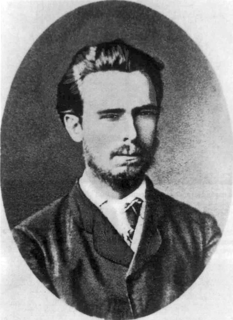A Quote by Sergey Nechayev
The only form of revolution beneficial to the people is one which destroys the entire state to the roots and exterminates all the state traditions, institutions and classes…. Day and night [the revolutionary] must have but one thought, one aim – merciless destruction…for him morality is everything which contributes to the triumph of the revolution. Immoral and criminal is everything that stands in its way.
Related Quotes
Taken as a whole, the Chinese revolutionary movement led by the Communist Party embraces the two stages, i.e., the democratic and the socialist revolutions, which are two essentially different revolutionary processes, and the second process can be carried through only after the first has been completed. The democratic revolution is the necessary preparation for the socialist revolution, and the socialist revolution is the inevitable sequel to the democratic revolution. The ultimate aim for which all communists strive is to bring about a socialist and communist society.
A revolution is bloody. Revolution is hostile. Revolution knows no compromise. Revolution overturns and destroys everything that gets in its way. And you, sitting around here like a knot on the wall, saying, “I’m going to love these folks no matter how much they hate me.” No, you need a revolution. Whoever heard of a revolution where they lock arms, as Reverend Cleage was pointing out beautifully, singing “We Shall Overcome”? Just tell me. You don’t do that in a revolution. You don’t do any singing; you’re too busy swinging.
A revolution is bloody, but America is in a unique position. She's the only country in history in a position actually to become involved in a bloodless revolution. The Russian revolution was bloody, Chinese revolution was bloody, French revolution was bloody, Cuban revolution was bloody, and there was nothing more bloody then the American Revolution. But today this country can become involved in a revolution that won't take bloodshed. All she's got to do is give the black man in this country everything that's due him, everything.
Whatever you want to call it, socialism, liberalism, this is who they are. They corrupt everything. Folks, their targets are the institutions and traditions that have given the world its morality, its virtue. The institutions and traditions which have defined freedom and liberty. That's what the left attacks.
If you do not want the State to act like a criminal, you must disarm it as you would a criminal; you must keep it weak. The State will always be criminal in proportion to its strength; a weak State will always be as criminal as it can be, or dare be, but if it is kept down to the proper limit of weakness - which, by the way, is a vast deal lower limit than people are led to believe - its criminality may be safely got on with.
The State is the curse of the individual... The State must go! That will be a revolution which will find me on its side. Undermine the idea of the State, set up in its place spontaneous action, and the idea that spiritual relationship is the only thing that makes for unity, and you will start the elements of a liberty which will be something worth possessing.
The word 'revolution' first brings to mind violent upheavals in the state, but ideas of revolution in science, and of political revolution, are almost coeval. The word once meant only a revolving, a circular return to an origin, as when we speak of revolutions per minute or the revolution of the planets about the sun.
There are those, on the one hand, who hope to achieve the social revolution through the State by preserving and even extending most of its powers to be used for the revolution. And there are those like ourselves who see the State, both in its present form, in its very essence, and in whatever guise it might appear, an obstacle to the social revolution, the greatest hindrance to the birth of a society based on equality and liberty, as well as the historic means designed to prevent this blossoming.
The anarchists put the thing upside down. They declare that the proletarian revolution must begin by doing away with the political organization of the state. But to destroy it at such a moment would be to destroy the only organism by means of which the victorious proletariat can assert its newly-conquered power, hold down its capitalist adversaries, and carry out that economic revolution of society without which the whole victory must end in a new defeat and a mass slaughter of the workers similar to those after the Paris commune.
The industrial revolution fueled all of humanity, everything we do has been exploding ever since. It's been the biggest most impacting thing, not only for human beings in the last 250 million years, but also the planet, which caused the ice age, which buried the forest. It's this circle because of the industrial revolution, it's neither good or bad, it enabled all of modernization, extended our life, it changed everything. It's the most impactful thing that happened to the planet and the people.
Family is a difficult matter. I must admit I do not know that the state can intervene successfully in a family. It's a fact that everything is connected with the individualist temperament, the kind of economic environment which stresses the individual, but this is not directly the result of a state policy, nor do I see any good way by which the state could intervene except in some marginal ways.
Only the defeat of the proletariat in Germany in 1923 gave the decisive push to the creation of Stalin's theory of national socialism: the downward curve of the revolution gave rise to Stalinism, not to the theory of the permanent revolution, which was first formulated by me in 1905. This theory is not bound to a definite calendar of revolutionary events; it only reveals the world-wide interdependence of the revolutionary process.





























